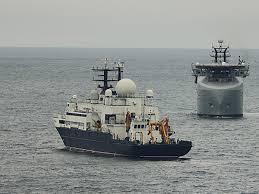UK raises alarm as Russian intelligence ship nears British waters, targets RAF pilots with laser disruptions

UK raises alarm as Russian intelligence ship nears British waters, targets RAF pilots with laser disruptions
The UK government has issued a stern warning to Moscow after a Russian intelligence-gathering vessel once again appeared close to British territorial waters, sparking renewed concerns about espionage, maritime security, and the safety of military personnel.
Defence Secretary John Healey revealed during a press briefing at Downing Street that the ship—identified as Yantar, a well-known Russian surveillance vessel—was operating just north of Scotland. According to Healey, this marks the second time within a year that Yantar has drifted into the UK’s wider maritime zone, raising both political and security alarms.
Healey explained that Yantar is no ordinary ship. It is specifically built to gather classified intelligence and map critical undersea cables—components essential to global internet connectivity and communication infrastructure. Many Western defence officials consider Yantar part of a larger Russian programme tasked with probing vulnerabilities in NATO countries’ underwater assets.
“My message to Russia and to President Putin is simple: we see you, and we understand your intentions,” Healey declared. “If the Yantar continues its journey south this week, we are fully prepared.”
The defence secretary described the ship as a strategic tool in Russia’s deep-sea warfare capabilities. The vessel operates under the Main Directorate of Deep-Sea Research, known in Russian circles as GUGI—a shadowy arm of the military linked to both surveillance missions and potential sabotage operations during conflict.
Healey emphasised that the UK closely monitors the vessel’s movements every time it approaches British waters. Surveillance efforts, he said, involve cooperation with NATO allies to ensure that any threat posed to critical underwater infrastructure is swiftly identified and deterred.
What makes this latest encounter more alarming is the ship’s alleged use of lasers against RAF pilots. Healey confirmed that RAF surveillance aircraft monitoring the vessel were targeted with laser beams intended to interfere with the pilots’ visibility—a “deeply dangerous act,” he said.
“This is the first time we’ve observed the Yantar deploying lasers against our forces,” Healey noted. “We take it extremely seriously.”
In response to these escalating behaviours, Healey announced that he had recently updated the Royal Navy’s rules of engagement, allowing naval assets to shadow the Russian vessel more aggressively whenever it enters the UK’s wider maritime zone.
He added that military options are ready should the vessel change course or attempt any provocative action, though he refrained from providing details, arguing such information would only benefit the Kremlin.
This warning comes amid broader debates about the UK’s defence readiness. A recent parliamentary committee report criticised the Ministry of Defence for excessive reliance on the United States, arguing that Britain lacks adequate capacity to defend its homeland and territories independently.
Healey disagreed with the severity of the committee’s findings but acknowledged that Britain must accelerate its defence capabilities—a priority, he said, since Labour took power last year.
Meanwhile, UK negotiators are racing to finalise an agreement with the European Union that would allow British defence companies to participate in a forthcoming €150bn EU defence loan scheme. The government insists the deal must represent “value for money” for UK taxpayers before any agreement is signed.
As tensions rise in European waters and Russia continues testing NATO’s resolve, the UK’s confrontation with Yantar underscores a new era of stealth competition beneath the seas—where data cables, surveillance tools, and unseen technologies shape the future of global security.
FAQ
1. What is the Yantar?
Yantar is a Russian intelligence-gathering ship designed to map and potentially tamper with undersea cables.
2. Why is the UK concerned?
The vessel has entered the UK’s wider waters twice in a year and recently targeted RAF pilots with lasers.
3. What action is the UK taking?
The Royal Navy has updated engagement rules, and the government is monitoring the ship closely with military options on standby.
4. What is GUGI?
A covert branch of the Russian military responsible for deep-sea operations, including surveillance and sabotage.

